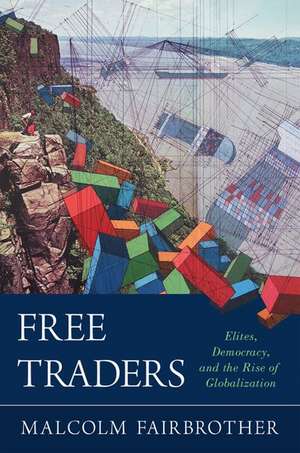Free Traders: Elites, Democracy, and the Rise of Globalization in North America
Autor Malcolm Fairbrotheren Limba Engleză Paperback – 9 oct 2019
| Toate formatele și edițiile | Preț | Express |
|---|---|---|
| Paperback (1) | 198.68 lei 10-16 zile | +46.25 lei 7-13 zile |
| Oxford University Press – 9 oct 2019 | 198.68 lei 10-16 zile | +46.25 lei 7-13 zile |
| Hardback (1) | 545.72 lei 31-37 zile | |
| Oxford University Press – 9 oct 2019 | 545.72 lei 31-37 zile |
Preț: 198.68 lei
Preț vechi: 230.10 lei
-14% Nou
Puncte Express: 298
Preț estimativ în valută:
38.02€ • 41.43$ • 32.04£
38.02€ • 41.43$ • 32.04£
Carte disponibilă
Livrare economică 22-28 martie
Livrare express 19-25 martie pentru 56.24 lei
Preluare comenzi: 021 569.72.76
Specificații
ISBN-13: 9780190635466
ISBN-10: 0190635460
Pagini: 272
Ilustrații: 10 black and white line drawings
Dimensiuni: 155 x 231 x 18 mm
Greutate: 0.39 kg
Editura: Oxford University Press
Colecția OUP USA
Locul publicării:New York, United States
ISBN-10: 0190635460
Pagini: 272
Ilustrații: 10 black and white line drawings
Dimensiuni: 155 x 231 x 18 mm
Greutate: 0.39 kg
Editura: Oxford University Press
Colecția OUP USA
Locul publicării:New York, United States
Recenzii
This excellent study dissects the role that businesses, economists, and political elites each played in constructing hyper-globalization. Fairbrother eschews easy generalizations, yet provides a unified and convincing account that challenges accepted theories.
Liberals assume that since free trade benefits everyone it's rational for democracies to favor trade integration. Critics of such integration argue that if that is the case then the dark cabals that make trade agreements out of sight of mass publics are something that needs explanation. Malcolm Fairbrother resolves this contradiction. By showing us how in developed countries it's a mercantilist' 'folk ideology' among business elites that drives integration, while in developing countries free trade ideology among top bureaucrats carries the day, Fairbrother identifies the real pro-globalization coalitions at work in the global economy.
In this highly original book, Fairbrother presents North American Free Trade Agreement (NAFTA) as a case study in really-existing globalization. Policy actors from all three partner-nations reflect on events and motivations in their own words, describing an agreement bearing little resemblance to the idealized 'free trade' described in macroeconomics textbooks. As we reflect back on the allegedly golden years of globalization, Fairbrother's work will give us a great deal to think about.
Liberals assume that since free trade benefits everyone it's rational for democracies to favor trade integration. Critics of such integration argue that if that is the case then the dark cabals that make trade agreements out of sight of mass publics are something that needs explanation. Malcolm Fairbrother resolves this contradiction. By showing us how in developed countries it's a mercantilist' 'folk ideology' among business elites that drives integration, while in developing countries free trade ideology among top bureaucrats carries the day, Fairbrother identifies the real pro-globalization coalitions at work in the global economy.
In this highly original book, Fairbrother presents North American Free Trade Agreement (NAFTA) as a case study in really-existing globalization. Policy actors from all three partner-nations reflect on events and motivations in their own words, describing an agreement bearing little resemblance to the idealized 'free trade' described in macroeconomics textbooks. As we reflect back on the allegedly golden years of globalization, Fairbrother's work will give us a great deal to think about.
Notă biografică
Malcolm Fairbrother is a professor of sociology at Umeå University, Sweden, and the University of Graz, Austria. He is also a researcher at the Institute for Futures Studies, Stockholm.
